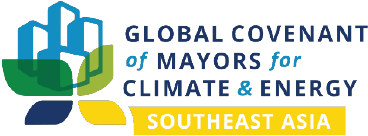The Global Covenant of Mayors Southeast Asia region (GCoM SEA) together with implementing partner Universiti Teknologi Malaysia (UTM) and GCOM pilot city partner Putrajaya Corporation held their Focus Group Discussion (FGD) for the preparation of the Putrajaya Climate Action Plan 2030 under the GCOM Common Reporting Framework on 19 July 2022.
The President TPr Dato’ Fadlun bin Mak Ujud delivered the keynote address and thanked everyone who dedicated their time and commitment in contributing inputs towards Putrajaya’s Climate Action Plan 2030. During the opening ceremony, the Deputy President Shamsul Bahrin bin Rahmat and the Director for Development Plan and Planning Research Section (Sustainable Development and Housing Division, City Planning Department) TPr. Puan Noor Sita binti Abbas were also present with 28 national stakeholders.

The FGD session kick-started with Prof. Ho Chin Siong, Director, UTM-Low Carbon Asia Research Centre, Universiti Teknologi Malaysia Johor Bahru who explained the objectives and aims behind the Climate Action Plan for Putrajaya and the work that has been developed and implemented in Putrajaya for the last 11 years. TPr. Chau Loon Wai, FABU, Universiti Teknologi Malaysia Johor Bahru moderated the FGD which comprised two FGD Working Groups. Key national stakeholders were invited to ensure the FGD session would be inclusive and comprehensive. Other senior experts and research assistants from University Teknologi Malaysia were also present to guide the FGD discussions, compilation of inputs, and synthesis from the national stakeholders.
Aims and Objectives of the Focus Group Discussions:
Putrajaya city was using the FGD session to introduce the GCoM and Common Reporting Framework (CRF) compliant Climate Action Plan (CAP) for the City of Putrajaya to all the invited national stakeholders. Universiti Teknologi Malaysia (UTM) an implementing partner under the GCOM worked intensively on the first draft of the CAP for Putrajaya with the Putrajaya Corporation. The preliminary results of Putrajaya’s Greenhouse Gas Inventory (GHGI) and Climate Risks Vulnerability Assessment (CRVA) findings as well as tier 3 data used for verification were presented to the national stakeholders and were updated after analysing and synthesising inputs from the various stakeholders during the feedback sessions. The key stakeholders at this first FGD were mainly members of the Putrajaya Green City Task Force.

Malaysia joined the United Nations Framework Convention on Climate Change (UNFCC) in 1994 and pledged in 2009 to reduce its GHG emissions intensity of GDP by up to 40% by 2020 compared to 2005 levels. Malaysia increased its commitment to 45% at COP26 in 2021, with the goal of achieving it by 2030 using the same 2005 baseline, subject to international financial support. Putrajaya is dedicated to exceeding this objective by 2030 with a target of 33% reduction in GHG emissions absolute compared to the baseline year of 2021.

What Putrajaya hopes to achieve collectively with assistance from GCoM SEA project:
- to progress from Putrajaya Green City 2025 7 focus areas and 12 actions (August 2011) to Climate Action Plan (CAP) 2030 (October 2022) focusing on 2 key pillars: climate change mitigation and climate change adaptation
- to better understand the stakeholders’ views and aspirations for incorporation into the proposed Putrajaya Climate Action Plan 2030 (PJ CAP 2030) towards a more people-centric, sustainable, and climate-smart Putrajaya
- to gain better stakeholders’ support and buy-in for the proposed Putrajaya CAP 2030 towards more effective implementation of the CAP
- to strengthen the current Putrajaya Green City Task Force network for continuous long-term engagement in climate action planning for Putrajaya


What do we expect for the rest of 2022 to 2023?
- Completion of the Putrajaya CAP 2030 by October 2022 for eventual adoption and implementation by the Putrajaya Corporation (PPj)
- Capacity building for Putrajaya Corporation staff on Greenhouse Gas Inventory (GHGI), Climate Risk and Vulnerability Assessment (CRVA), GHG emissions mitigation target setting, and climate adaptation goals setting
- Knowledge sharing and potential city-to-city collaboration through participation in the GCoM Regional Workshop in September 2022 (pending final confirmation of dates) in Jakarta
- Voluntary monitoring and reporting of GHG emissions and adaptation planning for GCoM-compliant badges in mitigation and adaptation by 2023 and beyond
Special thanks and gratitude are extended to all national stakeholders of the Focus Group Discussion (FGD) from various key federal, state, and local agencies and the private sectors who contributed extensively during the FGD session.

Global Covenant of Mayors for Climate and Energy Southeast Asia (GCoM SEA) funded by the European Union (EU) consist of four Southeast Asian countries, namely Malaysia, Viet Nam, Indonesia, and Thailand. The mitigation and adaptation of climate change will continue to be the most pressing issue for Malaysia. Thus, urgent actions are needed to limit the rate of current climate change. On top of that, cooperation amongst key actors remains key in combating this issue and GCOM will be key in facilitating this entire process. For further information, kindly contact Ms. Jacqueline Chang, Country Coordinator for Malaysia at [email protected]
—
Written by: Jacqueline Chang
Reviewed by: Rona Ikram Putri




